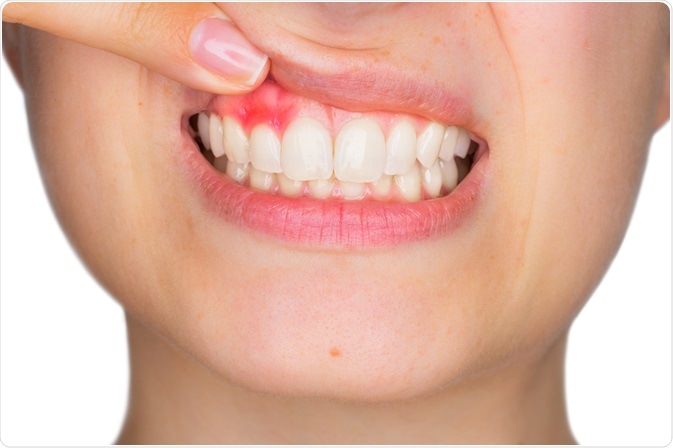Several different nutritional deficiencies can increase the likelihood of developing certain oral diseases.

Image Credit: Monkey Business Images/Shutterstock.com
Introduction
To retain adequate nutritional health, individuals must consume appropriate amounts of vitamins, minerals, fiber, water, carbohydrates, proteins, fats, and other micronutrients. When there is an imbalance between an individual’s nutritional and energy supply and their body’s demand, malnutrition occurs.
Malnutrition can not only be affected by compromised oral health but can also exert its effects on an individual’s oral health conditions. The identification and management of oral health conditions combined with optimal nutritional intake are therefore critical to maintaining a good quality of life (QoL).
Nutrition and oral health
A well-balanced diet that is high in micronutrients and macronutrients has beneficial effects on both the oral mucosa and dental hard tissues; however, both a deficit and an oversupply of these nutrients can lead to deleterious oral health effects ranging from dental erosion, dental caries, periodontal diseases, oral mucosa diseases, oral cancer, and various infectious diseases.
Dental erosion
Dental erosion occurs due to mechanical processes, such as abrasive forces, as well as chemical reactions, such as continuous exposure to nonbacterial acids. Erosive teeth have been stripped of the softened layer through a process that first begins with the removal of enamel and then dentin.
A diet rich in substances containing citric acid, phosphoric acid, ascorbic acid, malic acid, tartaric acid, and carbonic acid can lead to dental erosion. Many of these dietary acids can be found in soft drinks, fruits, fruit juices, certain herbal teas, vinegar, and dry wine.
In addition to reducing salivary pH values, enamel dissolution by these dietary acids is also determined by the type and amount of acid being ingested, the titratable acidity, buffering capacity, and temperature of the drink.
Acute consumption of these beverages is not typically associated with causing dental erosion; however, prolonged contact between tooth enamel and these drinks, particularly soft drinks, significantly increases the risk of enamel demineralization.
Dental caries
Dental caries is used to describe irreversible demineralization of both enamel and dentin. Typically, dental caries occur as a result of the anaerobic metabolism of dietary sugars, which results in the formation of organic acids in the dental plaque.
Individuals with higher daily ingestion of dietary sugars, which more commonly occurs in developed countries, are at a higher risk of developing dental caries.
As compared to fructose, maltose, lactose, and glucose, sucrose has been found to have a higher cariogenic potential. Certain dietary foods and drinks like cheese and milk, both of which contain higher concentrations of lactose, contain nutrients like calcium, phosphate, and casein, all of which are associated with caries preventative actions.
Other foods that can reduce cariogenicity include those that stimulate salivary flow including peanuts, chewing gums, lemons, and hard cheeses. A high-fiber diet can also aid in the prevention of caries by attenuating the absorption of sugars present in other food.
Notably, sugar substitutes like xylitol are associated with reducing the incidence of dental caries by up to 85%. While adequate fluoride applications can reduce the risk of dental caries, even when high amounts of sugar are ingested, it is generally recommended that individuals reduce the amount and frequency of their sugar consumption to reduce their risk of developing dental caries.
Periodontal and oral diseases
Otherwise known as gum disease, periodontal disease affects the gums, which are the supporting component of teeth. If left untreated, periodontal diseases can lead to tooth loss, which increases the likelihood that an individual experiences altered masticatory function, reduced dietary intake, and altered nutritional status.
Malnourished individuals are often at a higher risk of periodontal diseases as a result of their severe deficiencies in several nutrients including vitamins A, C, and E, folic acid, and calcium. Comparatively, deficiencies of vitamin B, iron, and folate can increase the likelihood that an individual develops diseases of the oral mucosa such as recurrent aphthous stomatitis (RAS), glossitis, cheilitis, and angular stomatitis.
Vitamin A is crucial to maintaining the integrity of the epithelium; therefore, a vitamin A deficiency can lead to gingivitis, gingival hypoplasia, proliferation of the crevicular epithelium, and the resorption of alveolar. Whereas a deficiency in vitamin B complex can reduce an individual’s resistance to bacterial infections, low folic acid levels can alter the health of periodontal tissues and inhibit their ability to act against bacterial insults.
Vitamin C is well-known for its antioxidant properties, which allows this vitamin to play a key role in the maintenance and repair of connective tissues. Therefore, a deficiency in vitamin C has been strongly correlated with periodontitis.

Image Credit: Stefano Garau/Shutterstock.com
Oral cancer
Aside from the genetic and environmental factors that can influence the development of cancer, certain foods appear to have protective effects against oral cancer, whereas other food products can contribute to an increased risk of developing oral cancer.
Some foods that offer protective effects against oral cancer include green vegetables, carrots, tomatoes, and cruciferous vegetables, all of which provide the greatest benefits when eaten raw.
Certain food products, such as meat, are associated with inducing oxidative damage, which can damage DNA and increase the likelihood of carcinogenesis. Comparatively, foods containing antioxidants such as vitamins A, C, E, beta carotene, and selenium have demonstrated a protective role against oxidative damage and subsequently provided a reduced risk of oral cancer.
Additionally, individuals who consume a diet rich in fat, such as pasta, cheese, red meat, and fried foods, as well as those cooked at high temperatures or in the microwave are at a higher risk of developing oral cancer.
References and Further Reading
- Gondivkar, S. M., Gadbail, A. R., Gondivkar, R. S., et al. (2019). Nutrition and oral health. Disease-a-Month 65(6); 147-154. doi:10.1016/j.disamonth.2018.09.009.
- Toniazzo, M. P., de Sant’Ana Amorim, P., Mustafa, F. W., et al. (2018). Relationship of nutritional status and oral health in elderly: Systematic review with meta-analysis. Clinical Nutrition 37(3); 824-830. doi:10.1016/j.clnu.2017.03.014.
- Scardina, G. A., & Messina, P. (2012). Good Oral Health and Diet. Journal of Biomedicine and Biotechnology. doi:10.1155/2012/720692.
Last Updated: Sep 14, 2020